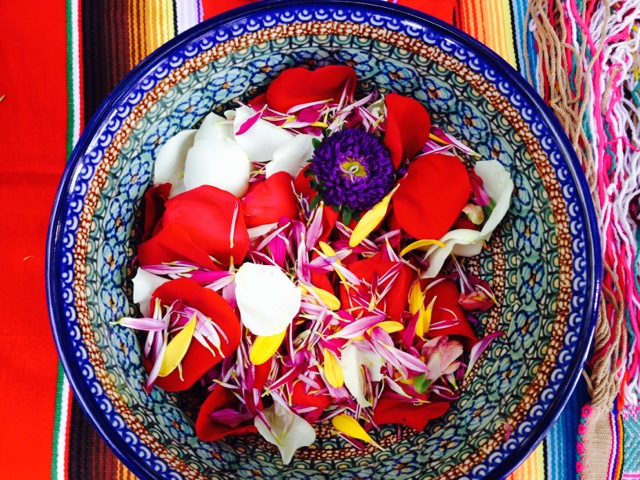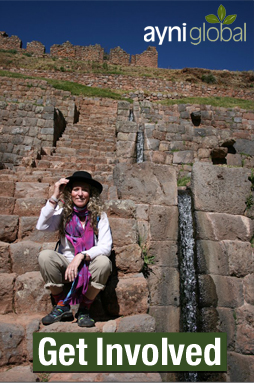
Spirit is an invisible force made visible in all life.— Maya Angelou
It is easy to connect to the mystery of spirit and place when we are on a spiritual quest, visiting sacred sites, or engaging in ceremony with others. The beauty, the time away, the intentions we set, all open a door for us to enter that mystery. But, how can we do this on a daily basis? Is it possible for us to maintain a connection during ordinary living?
We work, run a household, raise children, socialize, drive in traffic, and are connected to the Internet. External stimuli in a busy, modern environment are a constant distraction. For those of us who follow a spiritual path, a pilgrimage can expand our awareness, but it is all too easy to fall back to sleep once we re-enter our day-to-day lives. It takes dedication to remember what we have learned and to apply it.
Ayni is the Foundation Principle of Reciprocity
Reciprocity (Ayni) is the foundation of the Q’ero worldview; it characterizes how they live their daily life. All things begin with an offering to Pachamama (the divine feminine principle or the cosmic mother), the Apus (mountain spirits), and the Awkikuna (nature spirits). Practical gratitude is a way of life for the Q’ero, and nothing of import happens without it.
The practice of reciprocity is one way to access the sacred in daily life. However, this practice does not have to be elaborate, nor do you have to travel further than your own home. Often it is as simple as taking a time out from an overly hectic workday. In this mindful pause, we notice what is around us and remember to give thanks. In slowing down and pausing, we are able to reconnect to the miracle of life. Small daily events are opportunities to be mindful. Every time we change activities, walk through a doorway, or prepare to eat a meal, we can stop, center ourselves, and make a silent offering of thanksgiving.
Re-Wiring Our Brains for the Good
In their groundbreaking book The Buddha’s Brain (New Harbinger Publications, Oakland, 2009), authors Rich Hansen and Richard Mendius tell us that our brains are wired to find what is wrong. It is a survival mechanism that we have received from our ancestors, one that can still serve us. But the problem is that sometimes that is all we do! Think about how much time you spend worrying and how little time you take to savor a beautiful sunset or a fragrant cup of tea.
The authors advise that it would serve us to do what they call “looking for the good.” By this, they do not mean that we should disregard our pain or deny an injustice. What they are prescribing is a training of the mind that brings it back into balance. By focusing on the beauty of nature and the gifts we receive, we pause, and gratitude comes as a natural response to this practice.
They suggest that we take a minimum of 10 seconds (preferably more) to notice the beauty around us. If you think 10 seconds is not very long, count it out on your fingers—it’s longer than you realize! We can practice reciprocity in a similar manner.
Often, we try to embody our gratitude by taking action. When this happens, we can make simple offerings to Pachamama as a way of saying thank you. For example, I always keep fresh flowers in my home and office to remind me of the beauty of Mother Nature and the process of blossoming. When the flowers begin to fade, I collect the petals in a bowl. Whenever I am moved to make an offering, or whenever I venture outside for a walk or a hike, I bring those colorful petals with me to place at the base of a tree or sprinkle in the water. The flowers help to remind me to say thank you.
Sometimes we find ourselves empty-handed, yet wanting to make an offering. For the Q’ero, all ritual begins with the breath, the gift of life. They offer their breath to the Misa (the sacred bundles they carry), to the Apus, and to the three sacred coca leaves (the coca kintu). If you are breathing, you always have an offering!
Everyday reciprocity is also expressed through our conscious efforts to treat the Earth well. How we walk on our planet matters. Eating organic foods, turning off the faucet, planting drought-resistant plants in our yards, taking the bus, recycling, supporting local merchants who are environmentally and politically aware—these are all ways we can make a daily difference. Remembering the impact of the ecological footprint we leave behind us is a good way to give back to Mother Earth.
Diane Ackerman, author of I Praise My Destroyer (Vintage Books, New York 1998), wrote a beautiful prayer that reflects the spirit of everyday reciprocity. Below is an excerpt and a good way to start the day:
“I will honor all life —wherever and in whatever form it may dwell—on Earth my home, and in the mansions of the stars.”
Anytime Reciprocity
The practice of reciprocity can be done anytime, anywhere. In line at the grocery store, while enjoying a hot shower, in the presence of difficult people, while sharing a meal with loved ones, at daybreak, or with the setting sun.
These small thought acts of reciprocity help return to our lives a sense of wonder and of the sacred. They provide us the opportunity to show Pachamama how much we care about the Earth, each other, and how we live and relate to the rest of the world.




Hi Dawn, I have enjoyed reading your blog about everyday Ayni. I look forward to reading more of your future blogs. Thank you for sharing your thoughts!